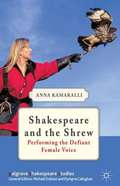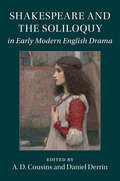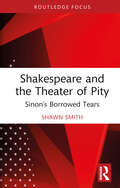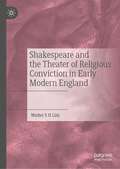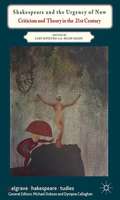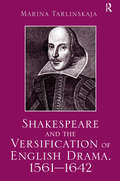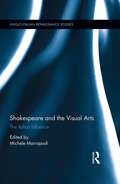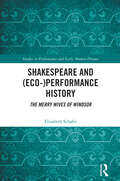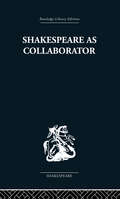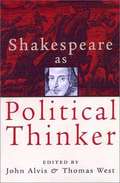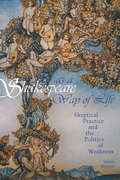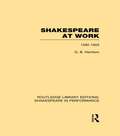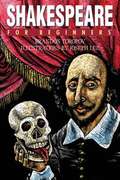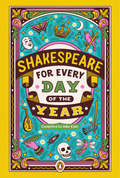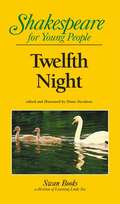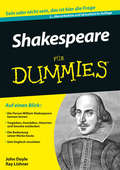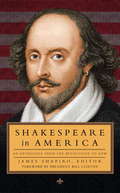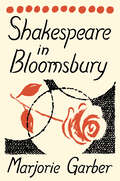- Table View
- List View
Shakespeare and the Shrew
by Anna KamaralliWhenever Shakespeare wrote a 'shrew' into one of his plays he created a character who challenged ideas about acceptable behaviour for a woman. This is as true today as when the plays were first performed. A shrew is a woman who refuses to be quiet when she is told to be, who says things that people do not want to hear. She is constructed to alleviate male anxieties through ridicule, but like so many objects of comedy or derision, she is full of power because of her very ability to generate these anxieties. 'Shrew' is supposed to be an insult, but has often been used to describe women enacting behaviour that can be brave, clever, noble or just. This book marries an examination of Shakespeare's shrews in his plays with their history in recent performance, to investigate our own attitudes to hearing women with defiant voices.
Shakespeare and the Soliloquy in Early Modern English Drama
by A. D. Cousins Daniel DerrinEncompassing nearly a century of drama, this is the first book to provide students and scholars with a truly comprehensive guide to the early modern soliloquy. Considering the antecedents of the form in Roman, late fifteenth and mid-sixteenth century drama, it analyses its diversity, its theatrical functions and its socio-political significances. Containing detailed case-studies of the plays of Marlowe, Shakespeare, Jonson, Ford, Middleton and Davenant, this collection will equip students in their own close-readings of texts, providing them with an indepth knowledge of the verbal and dramaturgical aspects of the form. Informed by rich theatrical and historical understanding, the essays reveal the larger connections between Shakespeare's use of the soliloquy and its deployment by his fellow dramatists.
Shakespeare and the Theater of Pity: Sinon’s Borrowed Tears (Routledge Focus on Literature)
by Shawn SmithThis volume explores Shakespeare’s interest in pity, an emotion that serves as an important catalyst for action within the plays, even as it generates one of the audience’s most common responses to tragic drama in the theater. For Shakespeare, the word "pity" contained a broader range of meaning than it does in modern English, and was often associated with ideas such as mercy, compassion, charity, pardon, and clemency. This cluster of ideas provides Shakespeare’s characters with a rich range of possibilities for engaging some of humanity’s deepest emotional commitments, in which pity can be seen as a powerful stimulus for fostering social harmony, love, and forgiveness. However, Shakespeare also dramatizes pity’s potential for deception, when the appeal to pity is not genuine, and conceals contrary motives of vengeance and cruelty. As Shakespeare’s works remain relevant for modern audiences and readers, so too does his dramatization of the powerful ways in which emotions such as pity remain essential to our understanding of our shared humanity and of our awareness of compassion’s role in our own private and civic lives.
Shakespeare and the Theater of Religious Conviction in Early Modern England
by Walter S LimThis book analyzes Shakespeare’s use of biblical allusions and evocation of doctrinal topics in Hamlet, Measure for Measure, The Winter’s Tale, Richard II, and The Merchant of Venice. It identifies references to theological and doctrinal commonplaces such as sin, grace, confession, damnation, and the Fall in these plays, affirming that Shakespeare’s literary imagination is very much influenced by his familiarity with the Bible and also with matters of church doctrine. This theological and doctrinal subject matter also derives its significance from genres as diverse as travel narratives, sermons, political treatises, and royal proclamations. This study looks at how Shakespeare’s deployment of religious topics interacts with ideas circulating via other cultural texts and genres in society. It also analyzes how religion enables Shakespeare’s engagement with cultural debates and political developments in England: absolutism and law; radical political theory; morality and law; and conceptions of nationhood.
Shakespeare and the Truth of Love
by James P. BednarzA comprehensive study of Shakespeare's forgotten masterpiece The Phoenix and Turtle . Bednarz confronts the question of why one of the greatest poems in the English language is customarily ignored or misconstrued by Shakespeare biographers, literary historians, and critics.
Shakespeare and the Urgency of Now
by Hugh Grady Cary DipietroThese essays address the intersections between Shakespeare, history and the present using a variety of new and established methodological approaches, from phenomenology and ecocriticism to the new economics and aesthetics.
Shakespeare and the Versification of English Drama, 1561-1642
by Marina TarlinskajaSurveying the development and varieties of blank verse in the English playhouses, this book is a natural history of iambic pentameter in English. The main aim of the book is to analyze the evolution of Renaissance dramatic poetry. Shakespeare is the central figure of the research, but his predecessors, contemporaries and followers are also important: Shakespeare, the author argues, can be fully understood and appreciated only against the background of the whole period. Tarlinskaja surveys English plays by Elizabethan, Jacobean and Caroline playwrights, from Norton and Sackville’s Gorboduc to Sirley’s The Cardinal. Her analysis takes in such topics as what poets treated as a syllable in the 16th-17th century metrical verse, the particulars of stressing in iambic pentameter texts, word boundary and syntactic segmentation of verse lines, their morphological and syntactic composition, syllabic, accentual and syntactic features of line endings, and the way Elizabethan poets learned to use verse form to enhance meaning. She uses statistics to explore the attribution of questionable Elizabethan and Jacobean plays, and to examine several still-enigmatic texts and collaborations. Among these are the poem A Lover's Complaint, the anonymous tragedy Arden of Faversham, the challenging Sir Thomas More, the later Jacobean comedy The Spanish Gypsy, as well as a number of Shakespeare’s co-authored plays. Her analysis of versification offers new ways to think about the dating of plays, attribution of anonymous texts, and how collaborators divided their task in co-authored dramas.
Shakespeare and the Versification of English Drama, 1561-1642
by Marina TarlinskajaSurveying the development and varieties of blank verse in the English playhouses, this book is a natural history of iambic pentameter in English. The main aim of the book is to analyze the evolution of Renaissance dramatic poetry. Shakespeare is the central figure of the research, but his predecessors, contemporaries and followers are also important: Shakespeare, the author argues, can be fully understood and appreciated only against the background of the whole period. Tarlinskaja surveys English plays by Elizabethan, Jacobean and Caroline playwrights, from Norton and Sackville’s Gorboduc to Sirley’s The Cardinal. Her analysis takes in such topics as what poets treated as a syllable in the 16th-17th century metrical verse, the particulars of stressing in iambic pentameter texts, word boundary and syntactic segmentation of verse lines, their morphological and syntactic composition, syllabic, accentual and syntactic features of line endings, and the way Elizabethan poets learned to use verse form to enhance meaning. She uses statistics to explore the attribution of questionable Elizabethan and Jacobean plays, and to examine several still-enigmatic texts and collaborations. Among these are the poem A Lover's Complaint, the anonymous tragedy Arden of Faversham, the challenging Sir Thomas More, the later Jacobean comedy The Spanish Gypsy, as well as a number of Shakespeare’s co-authored plays. Her analysis of versification offers new ways to think about the dating of plays, attribution of anonymous texts, and how collaborators divided their task in co-authored dramas.
Shakespeare and the Visual Arts: The Italian Influence (Anglo-Italian Renaissance Studies)
by Michele MarrapodiCritical investigation into the rubric of 'Shakespeare and the visual arts' has generally focused on the influence exerted by the works of Shakespeare on a number of artists, painters, and sculptors in the course of the centuries. Drawing on the poetics of intertextuality and profiting from the more recent concepts of cultural mobility and permeability between cultures in the early modern period, this volume’s tripartite structure considers instead the relationship between Renaissance material arts, theatre, and emblems as an integrated and intermedial genre, explores the use and function of Italian visual culture in Shakespeare’s oeuvre, and questions the appropriation of the arts in the production of the drama of Shakespeare and his contemporaries. By studying the intermediality between theatre and the visual arts, the volume extols drama as a hybrid genre, combining the figurative power of imagery with the plasticity of the acting process, and explains the tri-dimensional quality of the dramatic discourse in the verbal-visual interaction, the stagecraft of the performance, and the natural legacy of the iconographical topoi of painting’s cognitive structures. This methodolical approach opens up a new perspective in the intermedial construction of Shakespearean and early modern drama, extending the concept of theatrical intertextuality to the field of pictorial arts and their social-cultural resonance. An afterword written by an expert in the field, a rich bibliography of primary and secondary literature, and a detailed Index round off the volume.
Shakespeare and the Visual Imagination
by Stuart SillarsShakespeare's knowledge of the practices of visual art, its fundamental concepts and the surrounding debates is clear from his earliest works. This book explores this relationship, showing how key works develop visual compositions as elements of dramatic movement, construction of ideas, and reflections on the artifice of theatre and language. The Taming of the Shrew, Love's Labour's Lost, Richard II and A Midsummer Night's Dream are explored in detail, offering new insights into their forms, themes, and place in European traditions. The use of emblems is examined in Titus Andronicus and As You Like It; studies of Venus and Adonis, some sonnets and The Rape of Lucrece reveal different but related visual aspects; a later chapter suggests how the new relation between seeing and soliloquy in The Rape of Lucrece is developed in other plays. Extensively illustrated, the book explores Shakespeare's assimilation and exploration of visual traditions in structure, theme and idea throughout the canon.
Shakespeare and: The Merry Wives of Windsor (ISSN)
by Elizabeth SchaferSeismic shifts in the theatrical meanings of The Merry Wives of Windsor have taken place across the centuries as Shakespeare’s frequently performed play has relocated to Windsor across the world, journeying along the production/adaptation/appropriation continuum.This (eco-)performance history of Shakespeare’s The Merry Wives of Windsor not only offers the first in-depth analysis of the play in production, with a particular focus on the representation of merry women, but also utilises the comedy’s forest-aware dramaturgy to explore Mistress Page’s concept of being ‘frugal in my mirth’ in relation to sustainable theatre practices. Herne’s Oak – the fictitious tree in Windsor Forest where everyone meets in the final scene of the play – is utilised to enable a maverick but ecologically based reframing of the productions of Merry Wives analysed here.This study engages with gender, physical comedy, and cultural relocations of Windsor across the world to offer new insight into Merry Wives and its theatricality.
Shakespeare as Collaborator
by Kenneth MuirThis edition first published in 1960. This book discusses the extent of Shakespeare's collaboration in the plays of Edward III, The Two Noble Kinsmen, Pericles and the lost Cardenio. It includes chapters on the dramatic value of the plays irrespective of authorship.
Shakespeare as Literary Dramatist
by Lukas ErneIn this groundbreaking study, Lukas Erne argues that Shakespeare, apart from being a playwright who wrote theatrical texts for the stage, was also a literary dramatist who produced reading texts for the page. The usual distinction that has been set up between Ben Jonson on the one hand, carefully preparing his manuscripts for publication, and Shakespeare the man of the theatre, writing for his actors and audience, indifferent to his plays as literature, is questioned in this book. Examining the evidence from early published playbooks, Erne argues that Shakespeare wrote many of his plays with a readership in mind and that these 'literary' texts would have been abridged for the stage because they were too long for performance. The variant early texts of Romeo and Juliet, Henry V, and Hamlet are shown to reveal important insights into the different media for which Shakespeare designed his plays.
Shakespeare as Political Thinker
by Thomas G. West John E. AlvisThe essays contained in this book proceed from the common conviction that Shakespeare's poetry conveys a wisdom about politics commensurate with his artistry. Well-known thinkers discuss Shakespeare's understanding of politics, the idea of the best polity, the relationship between character and political life, and the interpenetration of poetry, politics, religion, and philosophy.
Shakespeare as a Way of Life: Skeptical Practice and the Politics of Weakness
by James KuznerShakespeare as a Way of Life shows how reading Shakespeare helps us to live with epistemological weakness and even to practice this weakness, to make it a way of life. In a series of close readings, Kuzner shows how Hamlet, Lucrece, Othello, The Winter’s Tale, The Tempest, and Timon of Athens, impel us to grapple with basic uncertainties: how we can be free, whether the world is abundant, whether we have met the demands of love and social life.To Kuzner, Shakespeare’s skepticism doesn’t have the enabling potential of Keats’s heroic “negativity capability,” but neither is that skepticism the corrosive disease that necessarily issues in tragedy. While sensitive to both possibilities, Kuzner offers a way to keep negative capability negative while making skepticism livable. Rather than light the way to empowered, liberal subjectivity, Shakespeare’s works demand lasting disorientation, demand that we practice the impractical so as to reshape the frames by which we view and negotiate the world.The act of reading Shakespeare cannot yield the practical value that cognitive scientists and literary critics attribute to it. His work neither clarifies our sense of ourselves, of others, or of the world; nor heartens us about the human capacity for insight and invention; nor sharpens our ability to appreciate and adjudicate complex problems of ethics and politics. Shakespeare’s plays, rather, yield cognitive discomforts, and it is just these discomforts that make them worthwhile.
Shakespeare at Work, 1592-1603 (Routledge Library Editions: Shakespeare in Performance)
by G.B. HarrisonShakespeare against the background of his times, his world of the theatre and his dramatic development through the last years of Elizabeth’s reign. Originally published in 1933 and republished in 1958, this great work is an imagining, in plain narrative, of the life of Shakespeare backed with evidence of the history of the stage. Whatever wider significances modern critics distill from Shakespeare’s plays, it remains an elementary fact that he wrote plays to interest and entertain his contemporaries and this book takes a look at the immediate interests of his audience and how his work responded to them.
Shakespeare at Work: 1592-1603
by G. B. HarrisonProvides discussion of the plays of Shakespeare written and performed during this period.
Shakespeare behind Bars: One Teacher's Story of the Power of Drama in a Women's Prison
by Jean TrounstineIn this deeply stirring account, Jean Trounstine, who spent 10 years teaching at Framingham (MA) Women's Prison, focuses on six inmates who, each in her own way, discover in the power of Shakespeare a way to transcend the painful constraints of incarceration. Shakespeare Behind Bars is a powerful story about the redemptive power of art and education. Originally published in cloth in 2001, the paperback includes a new foreword that will inspire all teachers who work with students others have deemed unteachable. A new afterword updates readers on the prison art's program -- and the author herself -- since 2001.
Shakespeare for Beginners
by Brandon ToropovWilliam Shakespeare stands as the greatest writer the English language has ever produced. Even so, many people have never read him. Covering all of Shakespeare's plays, this volume offers clear, concise descriptions and plot summaries of each work; it lists key phrases and important themes, explains the main ideas behind each play and features excerpts of important passages.
Shakespeare for Every Day of the Year
by Allie Esiri"Shakespeare for Every Day of the Year is not just for Christmas, but for all time." —Helena Bonham CarterA magnificent collection of 365 passages from Shakespeare's works, for the Shakespeare scholar and neophyte alike.Make Shakespeare a part of your daily routine with Shakespeare for Every Day of the Year, a yearlong collection of passages from Shakespeare's greatest works. Drawing from the full spectrum of plays and sonnets to mark each day of the year, whether it's a scene from Hamlet to celebrate Christmas or a Sonnet in June to help you enjoy a summer's day. There are also passages to mark important days in the Shakespeare calendar, both from his own life and from his plays: You'll read a pivotal speech from Julius Caesar on the Ides of March and celebrate Valentine's day with a sonnet. Every passage is accompanied by an enlightening note to teach you its significance and help you better appreciate the timelessness and poetry of Shakespeare's words. Shakespeare for Every Day of the Year will give you a thoughtful way reflect on each day, all while giving you a deeper appreciation for the most famous writer in the English language.
Shakespeare for Freedom
by Ewan FernieShakespeare for Freedom presents a powerful, plausible and political argument for Shakespeare's meaning and value. It ranges across the breadth of the Shakespeare phenomenon, offering a new interpretation not just of the characters and plays, but also of the part they have played in theatre, criticism, civic culture and politics. Its story includes a glimpse of 'Freetown' in Romeo and Juliet, which comes to life in the 1769 Stratford Jubilee; the Shakespearean careers of the Leicester Chartist, Cooper, and the Hungarian hero, Kossuth; Hegel's recognition of Shakespearean freedom as the modern breakthrough; its fatal effects in America; the disgust it inspired in Tolstoy; its rehabilitation by Ted Hughes, and its obscure centrality in the 2012 Olympics. Ultimately, it issues a positive Shakespearean prognosis for freedom as a vital (in both senses), unending struggle.
Shakespeare for Young People: Twelfth Night
by William Shakespeare Diane DavidsonShakespeare for Young People enables students to enjoy the great plays of Shakespeare in the original language. The scripts, which have been cut to be performed in forty minutes, include descriptions and stage actions as well as production notes to help novice directors and actors. While the texts include only Shakespeare's original words, announcers introduce the story and poetry in the plays by reading them aloud or by acting them out.
Shakespeare für Dummies (Für Dummies)
by Ray Lischner John DoyleEntdecken Sie die Geheimnisse von Romeo, Hamlet, Macbeth & Co. Dachten Sie bisher immer, dass Shakespeare eine Nummer zu groß für Sie ist? Oder gehören Sie zu denjenigen, die dank der zahlreichen Verfilmungen seiner Werke gerne mehr über ihn erfahren möchten? Oder möchten Sie einmal einen Blick in die englischen Originale werfen? Dann sollten Sie sich dieses Buch nicht entgehen lassen. Fernab von trockenen Schulvorträgen und schlechten Aufführungen entführen Sie John Doyle und Ray Lischner in die spannende Welt von Shakespeare. Sie führen Sie an seine wichtigsten Werke heran: die Tragödien, Komödien, Historien und Sonette. Außerdem erfahren Sie alles über sein Leben und sein außergewöhnliches Englisch.
Shakespeare in America: An Anthology from the Revolution to Now
by James Shapiro'The History of Shakespeare in America,' writes James Shapiro in his introduction to this groundbreaking anthology. 'is also the history of America itself. ' From our beginnings as a nation, Shakespeare has been a central, inescapable part of our literary heritage, a figure so widely revered that, as Tocqueville noted in the 1830s, there was 'hardly a pioneer's hut' without a volume or tow. Shakespeare in America reveals how, for over two centuries, the plays have been a prism through which crucial American issues - revolution, slavery, war, social justice - were refracted, debated, and understood. Shapiro traces the rich and surprising story of how Americans made Shakespeare their own through a wide range of genres - poetry, fiction, essays, plays, memoirs, songs, speeches, letters, movie reviews, and comedy routines - and a remarkable roster of American writers: from Emerson, Hawthorne, Melville, Mark Twain, and Henry James to James Agee, John Berryman, Pauline Kael, Isaac Asimov, Adrienne Rich, and Jane Smiley. American statesmen and presidents from John Adams to Bill Clinton (in a foreword written for this volume) offer their own testimonies to Shakespeare's profound and enduring influence. The anthology also tracks the multitude of ways in which American theater and film have been indelibly marked by Shakespeare: actors from Charlotte Cushman and Edwin Booth to John Barrymore, Paul Robeson, and Marlon Brando reinterpret Shakespeare for each new era; the legendary productions of New York's Yiddish theater are evoked in Cynthia Ozick's story 'Actors'; in the Depression years, Orson Welles revolutionizes Shakespearean performance with is landmark productions of Macbeth and Julius Caesar; the creators of Kiss Me, Kate and West Side Story write Shakespeare into the history of the classic American musical theater; and Joseph Papp, renewing a once-flourishing popular taste for the plays, establishes a New York tradition with Shakespeare in the Park. Internationally acclaimed Shakespeare scholar James Shapiro introduces each piece with a lively and informative headnote to guide the reader through the fascinating record of our 250-year-long engagement with Shakespeare and his works - from the perennial interest in the birthplace at Stratford-upon-Avon to the uniquely American obsession with the question of who really wrote the plays - and supplements the texts with a sixteen-page illustration insert. 'The story of Shakespeare in America is the Story of America Itself''I think American will be fascinated to learn of our deep and early connection to the Bard, how he inspired presidents and incited mobs, and how vivid the legacy of one Englishman's imagination still sits within the consciousness of our country. Like Shakespeare's own plays, this anthology is full of enthralling stories and weird coincidences, and it's a treasure. ' Meryl Streep'P. T. Barnum loved Shakespeare so much he tried to buy the Bard's house and bring it to America. James Shapiro has shown why he didn't need to. Americans have always had their Shakespeare, and in this wonderful volume they will have him still. ' Michael Witmore, Director, Folger Shakespeare Library'This brilliant anthology, hilarious, heartbreaking, and thrilling, shows that Shakespeare is more than our greatest writer; in America, he has also been a battleground. With Shakespeare we have fought about race, anti-Semitism, and gender equality; we have debated class struggle and national independence. With Shakespeare we have forged our national identity. He has made us who we are. ' Oskar Eustis, Artistic Director, The Public Theater
Shakespeare in Bloomsbury
by Marjorie GarberThe untold story of Shakespeare&’s profound influence on Virginia Woolf and the rest of the Bloomsbury Group &“A spirited dance of minds.&”—Chris Vognar, Boston Globe For the men and women of the Bloomsbury Group, Shakespeare was a constant presence and a creative benchmark. Not only the works they intended for publication—the novels, biographies, economic and political writings, stage designs and reviews—but also their diaries and correspondence, their gossip and small talk turned regularly on Shakespeare. They read his plays for pleasure in the evenings, and on sunny summer afternoons in the country. They went to the theater, discussed performances, and speculated about Shakespeare&’s mind. As poet, as dramatist, as model and icon, as elusive &“life,&” Shakespeare haunted their imaginations and made his way, through phrase, allusion, and oblique reference, into their own lives and art. This is a book about Shakespeare in Bloomsbury—about the role Shakespeare played in the lives of a charismatic and influential cast, including Virginia and Leonard Woolf, Vanessa Bell, Clive Bell, Roger Fry, Duncan Grant, Lytton Strachey, John Maynard Keynes and Lydia Lopokova Keynes, Desmond and Molly MacCarthy, and James and Alix Strachey. All are brought to sparkling life in Marjorie Garber&’s intimate account of how Shakespeare provided them with a common language, a set of reference points, and a model for what they did not hesitate to call genius. Among these brilliant friends, Garber shows, Shakespeare was in effect another, if less fully acknowledged, member of the Bloomsbury Group.
